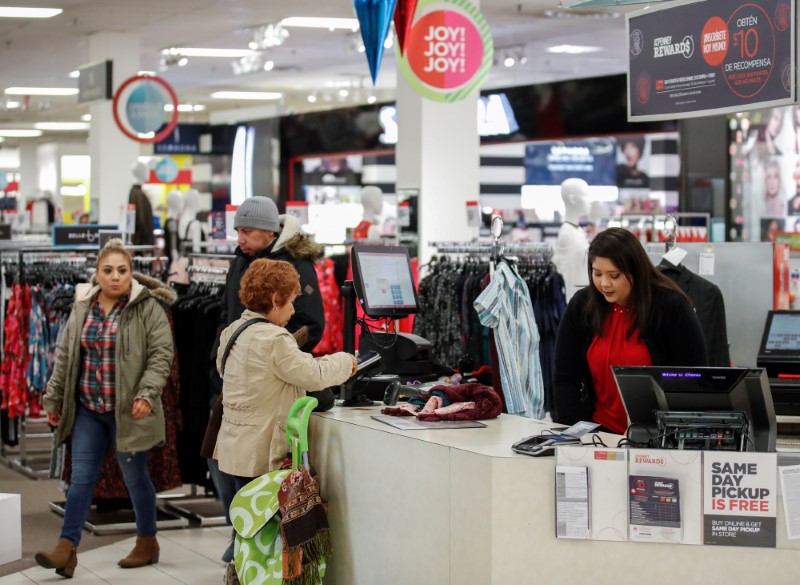By Lucia Mutikani
WASHINGTON (Reuters) - U.S consumer confidence ebbed in June, with households a bit pessimistic about their short-term income prospects, suggesting that an apparent acceleration in economic growth in the second quarter was unlikely to be sustained.
Economists blamed the dip in confidence on escalating tensions between the United States and its trade partners. The survey published by the Conference Board on Tuesday potentially signals some cooling in consumer spending. Plans to buy big-ticket items like automobiles fell this month.
"Those storm clouds on the horizon from the trade wars may be starting to affect consumer confidence negatively and that bodes poorly for the economic outlook later on this year," said Chris Rupkey, chief economist at MUFG in New York. The United States is engaged in tit-for-tat import tariffs with major trading partners, including China, Mexico, Canada and the European Union, which has roiled financial markets.
Economists have cautioned that the Trump administration's protectionist trade policies could offset the boost to the economy from the $1.5 trillion tax cut package passed late last year.
The Conference Board's consumer confidence index fell to a reading of 126.4 this month from an upwardly revised 128.8 in May. The index was previously reported at 128.0 in May.
The cutoff date for the survey was June 15, the same day President Donald Trump announced he was pressing ahead with hefty tariffs on $50 billion of Chinese imports. Beijing said it would respond with tariffs "of the same scale and strength."
The United States is also in a trade fight with Canada, Mexico and the European Union over steel and aluminum.
Stocks on Wall Street were trading higher on Tuesday, a day after the S&P 500 index (SPX) posted its steepest one-day loss since early April on trade-related worries.
The dollar (DXY) rose against a basket of currencies and prices of U.S. Treasuries dipped.
Economic growth appears to have surged early in the second quarter after hitting a soft patch at the start of the year. Gross domestic product estimates for the April-June period are as high as a 4.7 percent annualized rate. The economy grew at a 2.2 percent rate in the first quarter.
GROWTH SEEN SLOWING
"While expectations remain high by historical standards, the modest curtailment in optimism suggests that consumers do not foresee the economy gaining much momentum in the months ahead," said Lynn Franco, the Conference Board's director of economic indicators.
The survey's so-called labor market differential, derived from data about respondents who think jobs are hard to get and those who think jobs are plentiful, fell to 25.1 this month from 26.5 in May. That measure closely correlates to the unemployment rate in the Labor Department's employment report and is consistent with continued shrinking of labor market slack.
The labor market is viewed as being near or at full employment, with the unemployment rate at an 18-year low of 3.8 percent. But it has not spurred faster wage growth.
The Conference Board survey showed the percentage of consumers expecting an improvement in income fell to 18.8 percent in June from 21.4 percent in May. The share of those expecting a decrease rose to 8.7 percent from 8.0 percent last month.
The survey also showed a decline in the number of consumers planning to buy motor vehicles and household appliances. There was a modest rebound in home purchasing plans after a drop in May. The share of consumers planning to take a vacation slipped this month.
Other data on Tuesday showed the S&P CoreLogic Case-Shiller composite index of home prices in 20 metropolitan areas rose 6.6 percent in April on a year-over-year basis after increasing 6.7 percent in March. An acute shortage of homes on the market and strong demand are keeping prices elevated, though the momentum is slowing as mortgage rates rise.
The 30-year fixed mortgage rate averaged 4.57 percent last week and has risen more than 50 basis points this year, according to data from mortgage finance agency Freddie Mac. The Federal Reserve raised interest rates earlier this month for a second time this year and forecast two more rate hikes by the end of the year.

"With mortgage rates set to rise over the remainder of the year, we expect house price growth will continue to slow," said Matthew Pointon, property economist at Capital Economics in New York. "But record low levels of inventory will also provide support to prices, and the slowdown will be gradual."